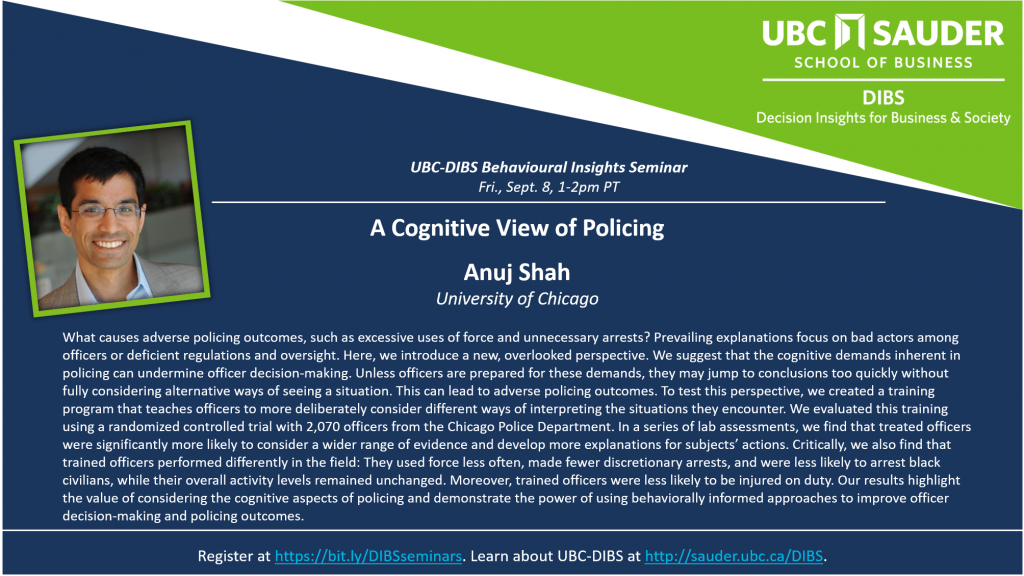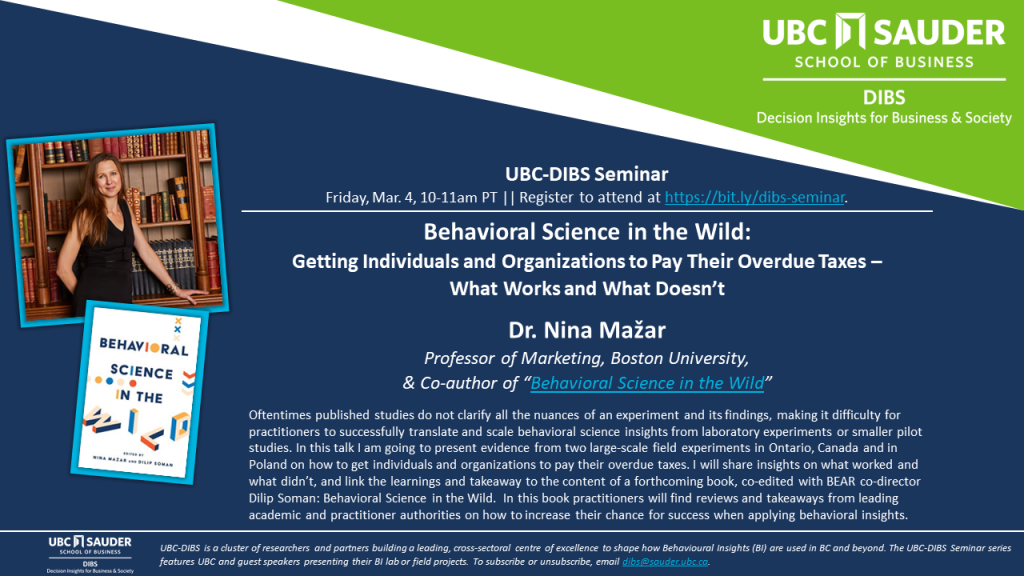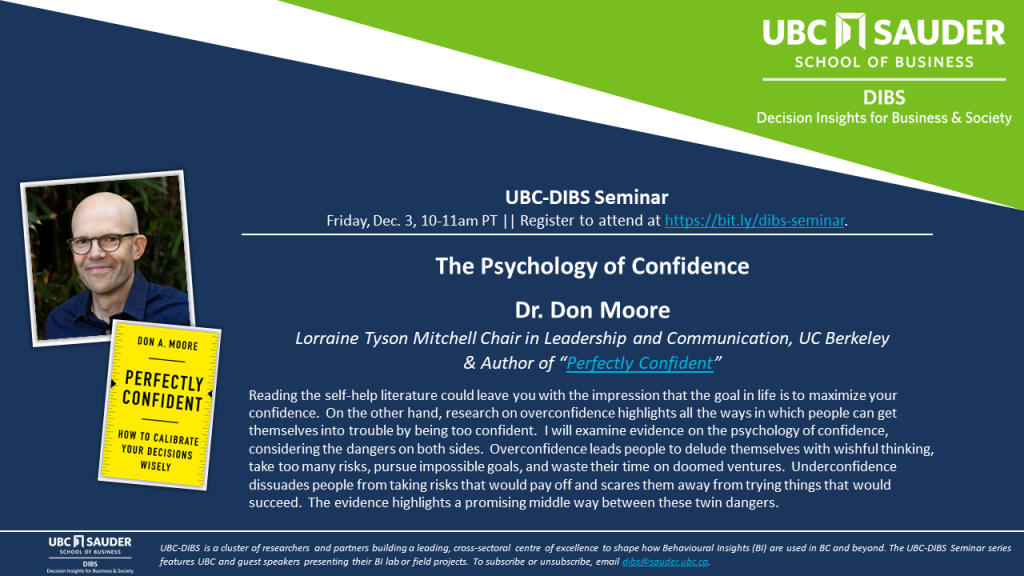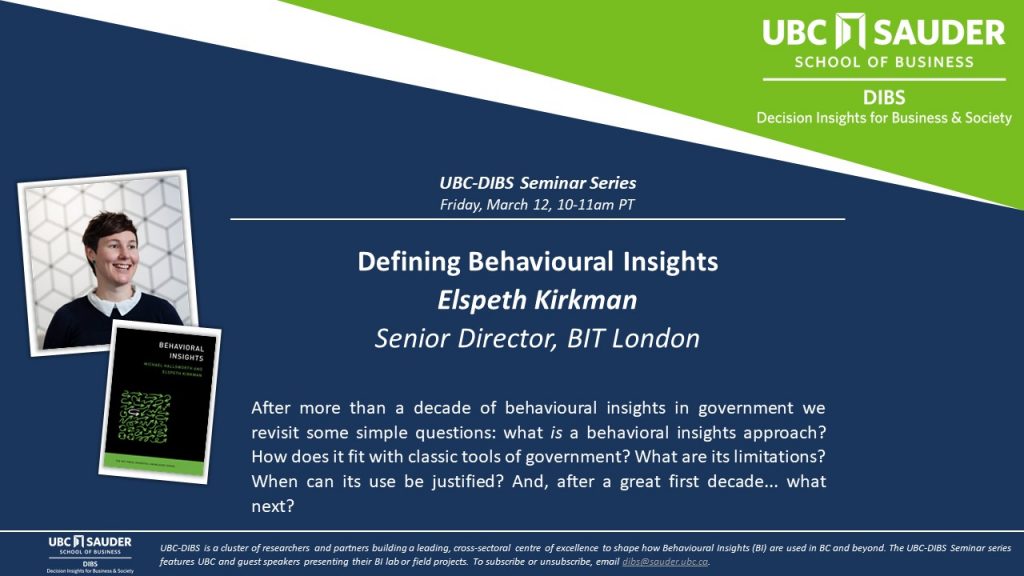Behavioural Insights at UBC

Decision Insights for Business & Society (UBC-DIBS) is a behavioural research and policy solutions initiative at UBC Sauder School of Business. Our mission is to improve outcomes across major societal and planetary challenges by improving our understanding of decision-making, encouraging long-term behaviour change, and working together toward an environmentally, economically, and socially sustainable future. We conduct behavioural and decision science research, offer Behavioural Insights training, and host events and resources.
Read our Annual Reports (2024-2025, 2023-2024, 2022-2023) to learn more about what we do.
Behavioural Insights Seminar
Our UBC-DIBS Behavioural Insights Seminar Series features researchers and practitioners sharing their field and lab projects that use the behavioural and decision sciences to “nudge for good”.
2024-2025 Behavioural Insights Seminar Series

- Zoom seminars are typically 1-2pm Pacific on Fridays. Register to attend at https://bit.ly/DIBS2425.
- Hybrid seminars are 1-2:30pm Pacific at UBC Sauder School of Business and Zoom
2024-2025

Julian House
(Ontario Behavioural Insights Unit)
“Reflections from a Decade of Applying Behavioural Science in the Public Sector”
[ Video not available ]

Praveen Kopalle
(Dartmouth College)
“Residential Electricity Conservation, Climate Change, and Delivering Clean Energy to Consumers”
[ Video ]

Sonia Kang
(University of Toronto)
“Diversity Language Impacts Perceived Organizational Sincerity and Anticipated Belonging”
[ Video not available ]

Luke Clark
(UBC)
“What Can Behavioural Scientists Learn
from Real-World Gambling Behaviour?”
[ Video ]
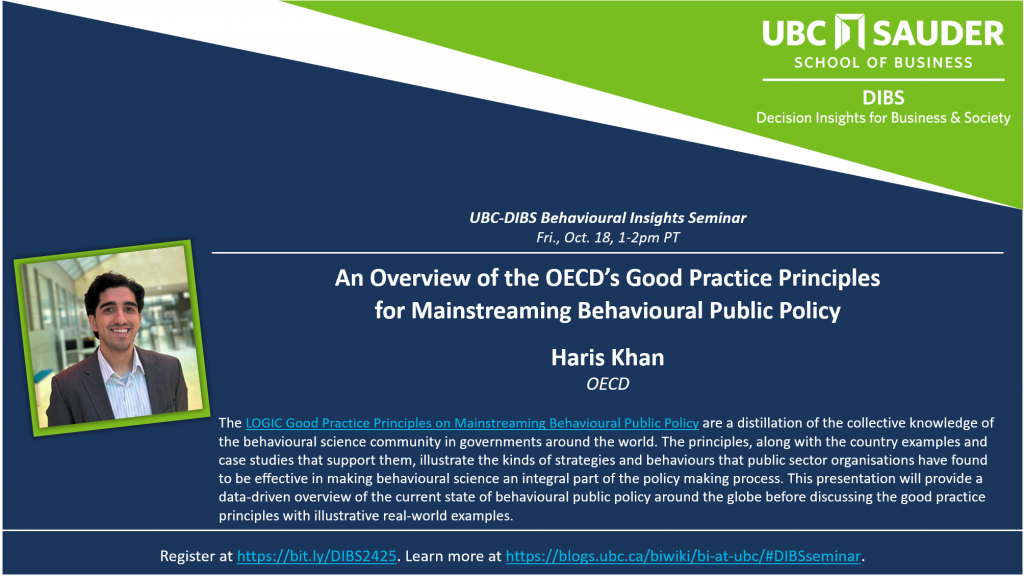
Haris Khan
(OECD)
“An Overview of the OECD’s Good Practice Principles for Mainstreaming Behavioural Public Policy”
[ Video ]
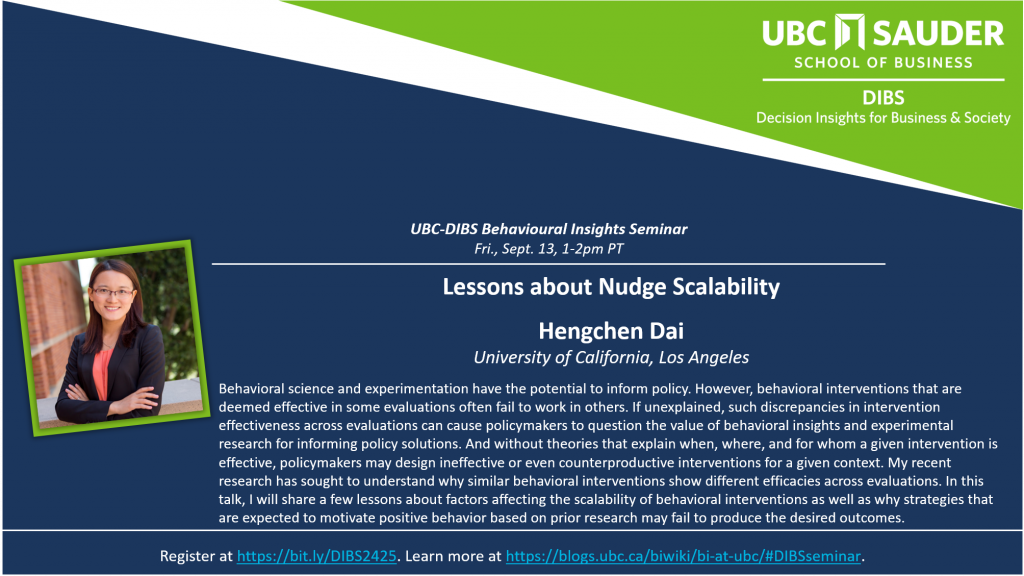
Hengchen Dai
(UCLA)
“Lessons about Nudge Scalability”
[ Video not available ]
2023-2024
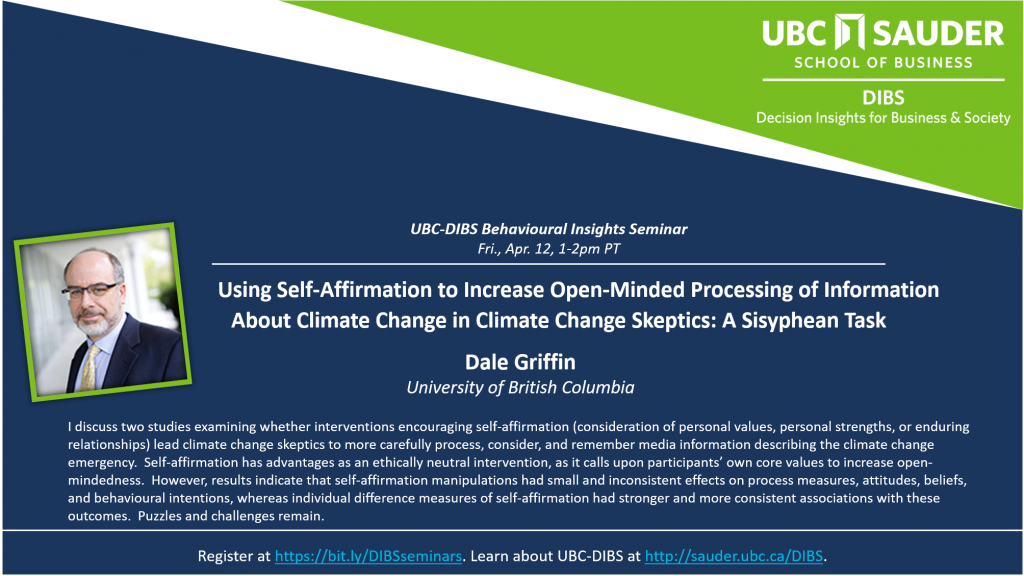
Dale Griffin
(UBC)
“Using Self-Affirmation to Increase Open-Minded Processing of Information About Climate Change in Climate Change Skeptics”
[ Video ]

Shahzeen Attari
(Indiana University)
“Behavioral Solutions & Challenges to Decarbonization”
[ Video ]

Rishad Habib
(Toronto Metropolitan University)
“Shifting Consumer Behavior to Address Climate Change”
[ Video ]

Matthew Davies
(Behavioural Science Aotearoa)
“Applying Behavioural Lenses and Insights to New Zealand’s Justice System”
[ Video ]

Jessica Leifer
(PARCA)
“Structural and Behavioural Barriers to Greater Climate Action Among Adults in Canada: Insights from the Program of Applied Research on Climate Action in Canada”
[ Video ]
2022-2023

Ammaarah Martinus
(UNESCO MGIEP)
“Applying Behavioural Insights to Large Organizations”
[ Video ]

Brittany Bingham & Andrea MacNeill
(Vancouver Coastal Health)
“Sustainable Health Equity for Patients, Public, & Planet”
[ Video ]
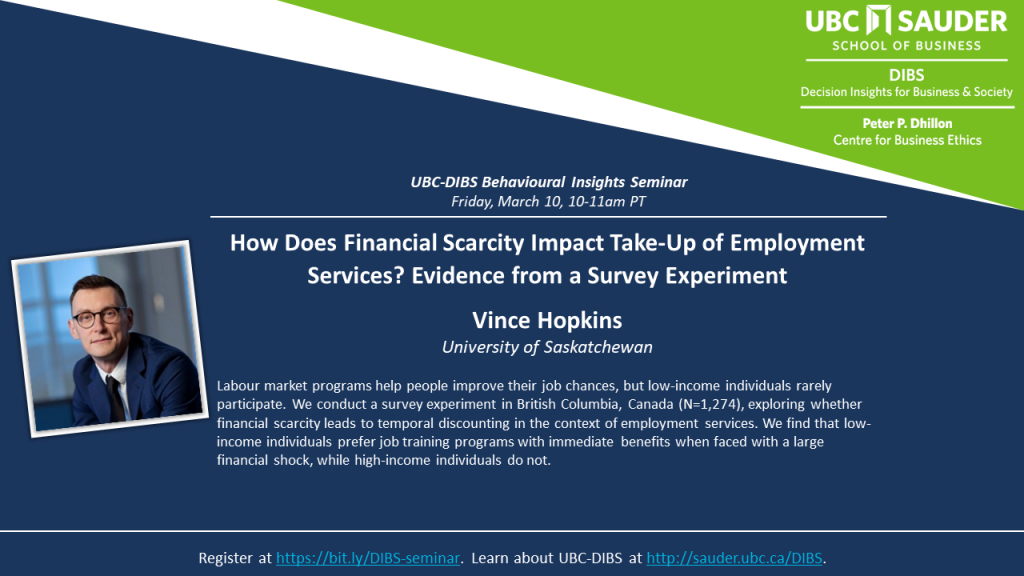
Vince Hopkins
(University of Saskatchewan)
“How Does Financial Scarcity Impact Take-Up of Employment Services? Evidence from a Survey Experiment”
[ Video ]

Erik Thulin
(Rare)
“The Behavioral Science of Changing Climate Culture”
[ Video ]
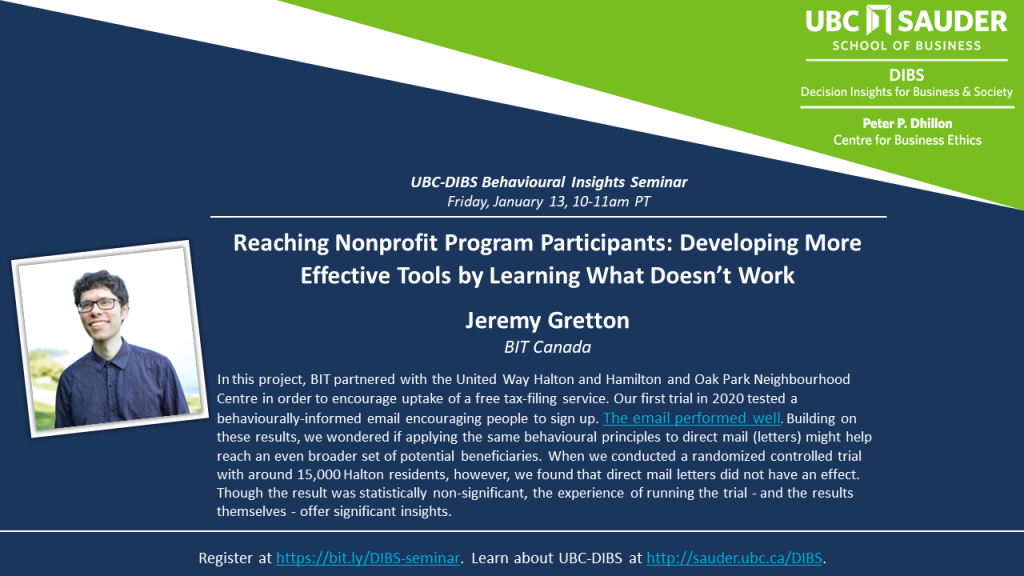
Jeremy Gretton
(BIT Canada)
“Reaching Nonprofit Program Participants: Developing More Effective Tools by Learning What Doesn’t Work”
[ Video ]
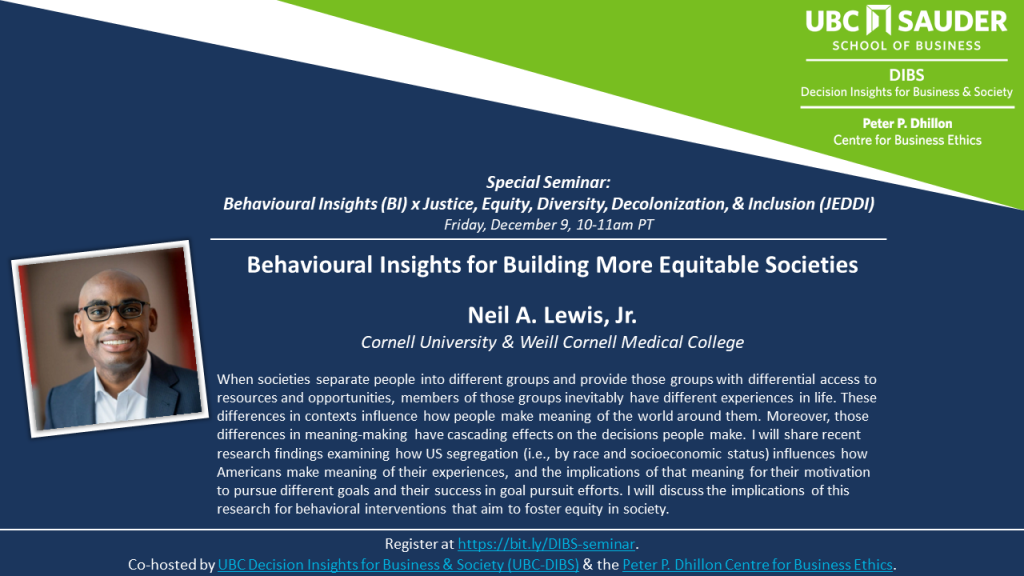
Neil Lewis, Jr.
(Cornell University)
“Behavioural Insights for Building More Equitable Societies”
[ Video ]
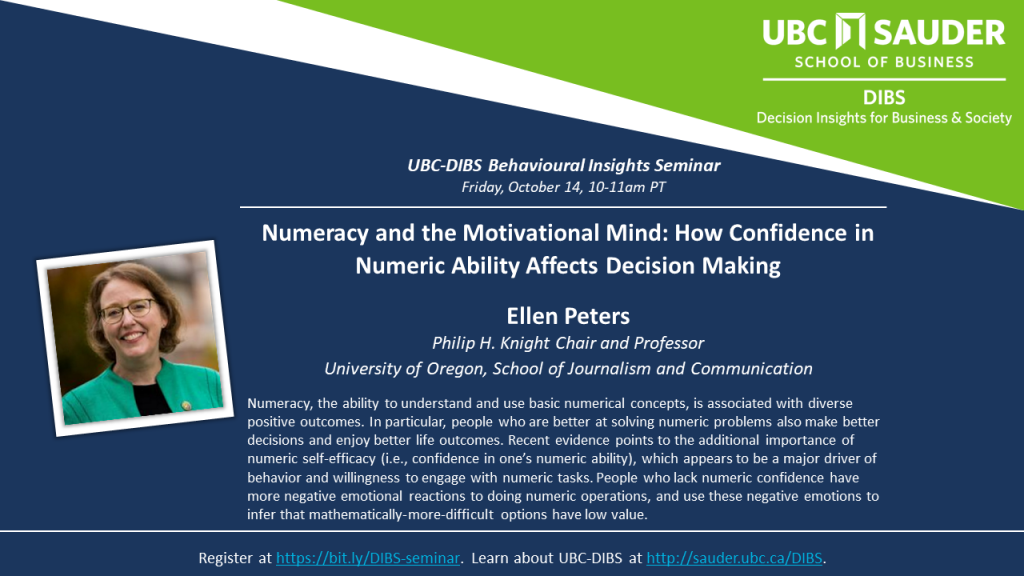
Ellen Peters
(University of Oregon)
“Numeracy and the Motivational Mind: How Confidence in Numeric Ability Affects Decision Making”
[ Video ]

Claire Tsai
(University of Toronto)
“Risky but Alluring: Severe COVID-19 Pandemic Influence Increases Risk Taking”
[ Video ]
2021-2022

David Hardisty
(UBC)
“Twice as Nice? A Longitudinal Field Study of Separate vs. Combined Nudges for Household Laundry Behaviours”
[ Video ]
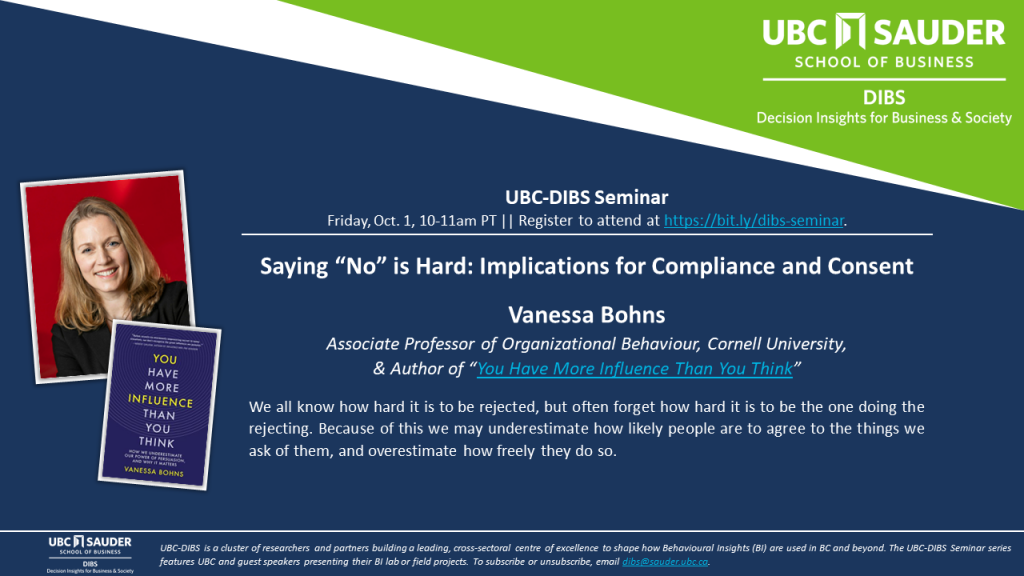
Vanessa Bohns
(Cornell University)
“Saying “No” is Hard: Implications for Compliance and Consent”
[ Video | Book ]
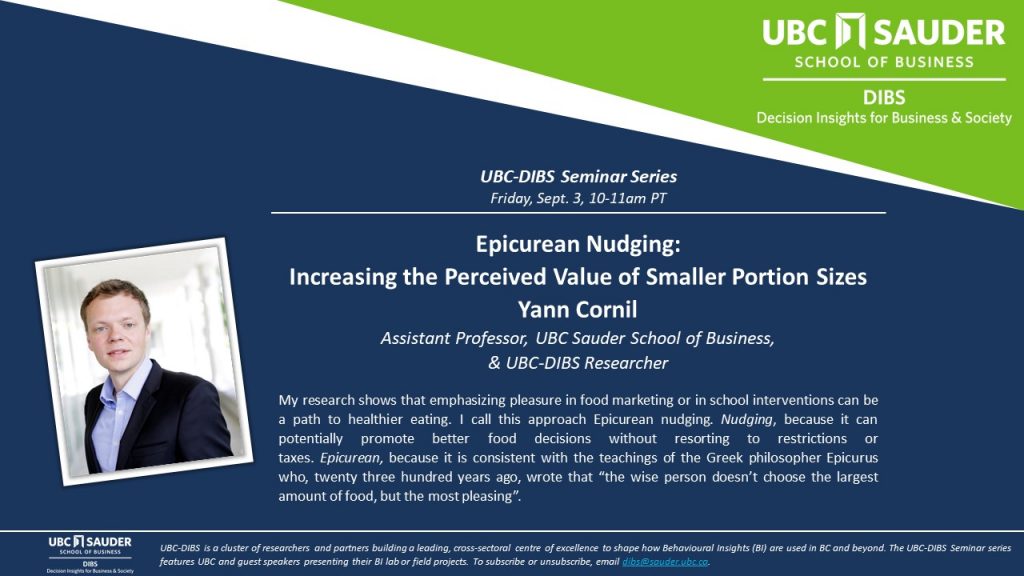
Yann Cornil
(UBC)
“Epicurean Nudging: Increasing the Perceived Value of Smaller Portion Sizes”
[ Video ]
2020-2021
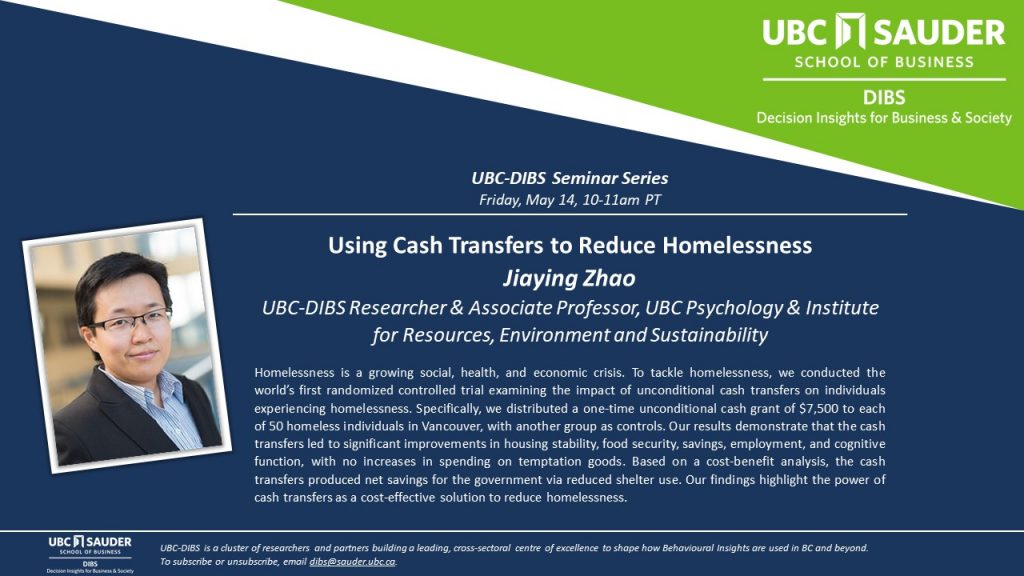
Jiaying Zhao
(UBC)
“Using Cash Transfers to Reduce Homelessness”
[ Video ]
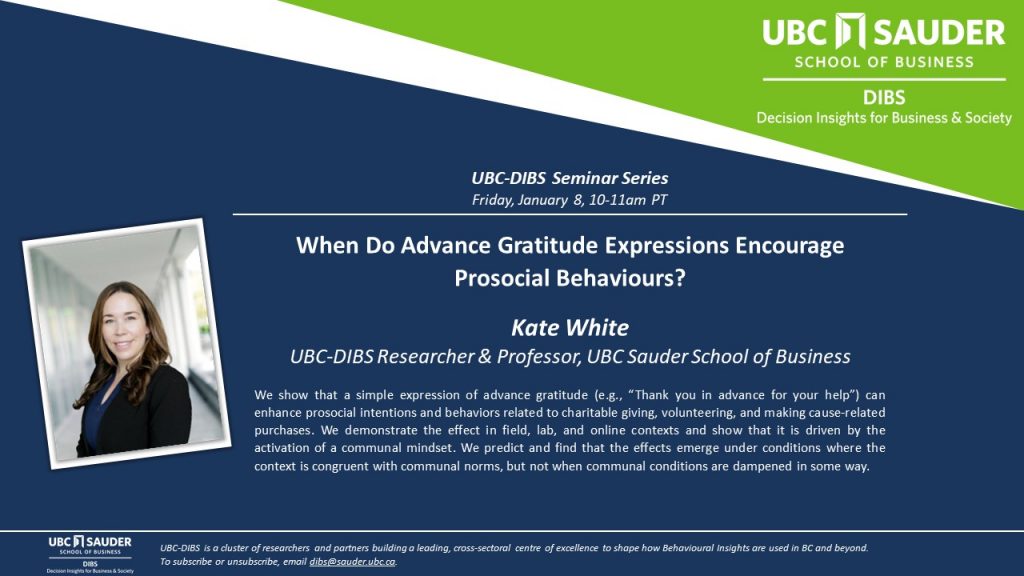
Kate White
(UBC)
“When Do Advance Gratitude Expressions Encourage Prosocial Behaviours?”
[ Video ]
Note: Book links are to Massy Books, an Indigenous-owned and -operated bookstore located in Vancouver.
UBC-DIBS Working Papers
UBC-DIBS has a working paper series featuring research projects from DIBS researchers as well as capstone projects from students in the UBC Advanced Professional Certificate in Behavioural Insights. You can also read our Annual Reports (2024-2025, 2023-2024, 2022-2023).
Research Reports
Analyzing the Effect of the Application of Behavioural Insights to Immunization Reminder Postcards in the Fraser Health Region
Michelle Zanette, Christina Fung, Meghan Martin, & Kirstin Appelt
[ Report ]
This project aimed to increase vaccination rates among young children in the Fraser Health region. New “Behavioural Insights informed” reminder postcards incorporated deadlines and/or checklists to help close the intention-action gap for parents with children due for their two-year-old vaccinations. Although the BI-informed postcards did not significantly increase immunization rates, the project team has several recommendations, including increasing the convenience of scheduling and attending appointments.
Keywords: behavioural insights, nudge, reminders, deadlines, checklists, public health, childhood immunizations
SHIFTing Consumer Behaviour
Pilot Program
Kate White, Rishad Habib, & Sid Mookerjee, in partnership with the Share Reuse Repair Initiative
[ Report ]
UBC-DIBS researcher Kate White and grad students Rishad Habib and Sid Mookerjee partnered with the Share Reuse Repair Initiative to offer circular innovators training on how to SHIFT consumers toward adopting circular behaviours (e.g., buying second-hand, repairing instead of replacing, choosing re-usable over single-use items, etc.) This report provides an overview of the training program as well as case studies from program participants.
Keywords: behavioural insights, nudge, SHIFT, environmental sustainability, circular economy, social influence, social norms, self interest
2023-2024 CAPSTONE PROJECTS
Increasing Organ Donor Registrations Among BC Public Servants Using E-Newsletters
Amy Watt, Karen Smallwood, Shellee Ritzman, & Talent Pun
(Advisor: Katherine White)
[ Working Paper ]
This project aimed to increase organ donation registrations. Three new behaviourally-informed messages were tested against a control message in newsletters reaching BC government employees. The behaviourally-informed message that challenged the audience’s assumptions about their registration status, “Many B.C. residents believe they’re organ donors, but they’re not.”, yielded the most web page visits and the most donor registrations. Based on these results, the project team recommends scaling this message; they also provide other recommendations to simplify registration and improve data collection.
Keywords: behavioural insights, nudge, reminders, social responsibility, convenience, organ donation
Using Salience to Encourage Small Appliance Recycling
Ellen Engelsbel & Megha Khurana
(Advisor: Jiaying Zhao)
[ Working Paper ]
This project aimed to increase recycling of small appliances. New “Behavioural Insights informed” messages were designed to make it easier to find key information, like locations and hours of local recycling depots. A control message was tested against the BI message on Google Display, Facebook, and Instagram. Although there was no measurable change in recycling rates, the BI message increased some types of online engagement. Based on these results, the project team recommend further research as well as other possible next steps.
Keywords: behavioural insights, nudge, salience, sustainability, recycling
Increasing Personal Optional Protection (POP) Enrolment to Protect Self-Employed Workers
Tim Hannan, Janet Hankins, Brent Novikoff, & Breanna Gregerson,
(Advisor: Kirstin Appelt)
[ Working Paper ]
This project aimed to increase uptake of Personal Optional Protection (POP), an optional insurance product offered by WorkSafeBC to self-employed workers in British Columbia who fall outside the provincial no-fault insurance system for workplace injuries. In a 2×2+1 randomized controlled trial, four email reminders were tested against a control no-reminder condition: The “inform” email included details about POP, the “inform plus head start” email included the POP details plus a link to the POP application, the “business loss aversion” email warned about potential impacts of adverse events, and the “business loss aversion plus head start” email included the warning plus the link. None of the email reminders significantly increased POP application rates. However, all four emails were opened at a higher rate than WorkSafeBC’s general benchmark. Building on these results, the project team recommends email reminders as a potential communication channel in parallel with conducting further research to inform next steps.
Keywords: behavioural insights, nudge, reminders, loss aversion, insurance, injury, workplace, program uptake
2022-2023 CAPSTONE PROJECTS
Using salience and availability to promote sustainable and healthy food choices in hospital cafeterias
Karina Spoyalo, Nicole Viduka, & Sarah-Jean Dixon (Advisor: Jiaying Zhao & Project Partner Andrea MacNeill)
Sustainable diets can achieve considerable reductions in greenhouse gas emissions and improvements in human health, but changing dietary behavior remains a challenge. We assessed the impacts of two behavioral insights strategies on bridging the intention-action gap related to sustainable and healthy food choices amongst hospital cafeteria patrons. In Study 1, increasing salience was associated with significant uptake of sustainable and healthy dishes, but the effect disappeared once the salience intervention was removed. In Study 2a, increasing availability of sustainable dishes corresponded to a significant increase in purchases of sustainable dishes, while decreasing availability in Study 2b followed a downward trend in purchases, suggesting that availability drove dietary choices. We recommend hospitals consider these choice architecture interventions to support the adoption of sustainable and healthy diets.
Keywords: behavioural insights, nudge, salience, availability, climate crisis, sustainable diet, planetary healthcare, public health
2021-2022 CAPSTONE PROJECTS
Nudging policymakers on gendered impacts of policy
Lindsay Bochon, Janet Dean, & Tanja Rosteck (Advisor: Jiaying Zhao)
[ PLOS One article ]
Despite the proliferation of nudge research in the last few decades, very little published work aims to nudge the behavior of policymakers. In a pre-registered randomized controlled trial, we emailed an invitation to policymakers in the Northwest Territories to attend an online briefing on gendered impacts of policy. Compared to the control condition, treatment condition invitations contained personal stories of two women whose lives were disproportionally impacted by public policies. After the briefing, we sent all participants a public pledge to lead and advocate for equity-oriented policymaking. Contrary to our prediction, there was a small backfiring effect where policymakers in the treatment condition were less likely to attend the briefing. However, two policymakers in the treatment condition signed the public pledge compared to one in the control condition. Although the current findings reveal the limits of using personal stories as a nudge, we discuss insights gained from this experiment and follow-up debriefings with policymakers.
Keywords: behavioural insights, nudge, public policy, sexual and gender issues, anecdotes
I Saw the Sign! Using Behaviourally-Informed Signs to Encourage Parking Compliance
James Climenhage, Mandy Khoo, & Whitney Queisser (Advisor: David Hardisty)
This project aimed to improve compliance with paid parking in the City of Vancouver. New “Behavioural Insights informed” parking signs incorporated salience by increasing sign and font size and adding more colour. Due to feasibility constraints, the control and BI-informed signs were compared in a quasi-experimental trial between two locations in the city. Although the BI-informed signs did not significantly increase parking compliance, the project team has several recommendations, including trialing in other locations and trialing signs incorporating other Behavioural Insights.
Keywords: behavioural insights, nudge, salience, loss aversion, compliance, signage, parking
Using Reminders to Expedite Claim Form Submission Among Injured Workers
Summer Roddick & Laura Ruiz (Advisor: David Hardisty)
This project aimed to improve form submission rates and timeliness for injured workers going through a claims process. New “Behavioural Insights informed” reminders were designed to simplify language and reduce friction by providing a link to the required form; they were sent at the right time and included a deadline to reduce procrastination. A control condition was compared against three intervention conditions (simple SMS reminder, simple email reminder, and simple SMS reminder plus detailed email) in a randomized controlled trial. All three reminders significantly increased both form submission rates and the timeliness of submission. Based on the results and implementation costs, the simple email reminder is recommended as the best solution. The project team also includes several recommendations for scaling and further research.
Keywords: behavioural insights, nudge, reminders, simplification, friction, prompts, deadlines, return to work
Shifting to Digital Communications
Amalia Colussi, Dana Hubackova, & Shannon McDonaugh (Advisor: Kirstin Appelt)
[ Conference Video & Slides ]
This project aimed to encourage pension plan members to shift to digital delivery of pension information. The basic “Behavioural Insights informed” email incorporated a reminder and reduced friction; the more comprehensive email also added a deadline and checklist. These BI-informed communications were compared to a control condition with no reminder in a randomized controlled trial. Reminders significantly increased the number of members logging into their online accounts and the comprehensive email significantly increased the number of members choosing digital delivery.
Keywords: behavioural insights, nudge, reminders, checklists, deadlines, friction, shift to digital
2020-2021 CAPSTONE PROJECTS
Increasing the Completion of Family Plans in Collaboration with Families
Erin Crowley, Caroline Grenier, & Kelsie Wright (Advisor: Dale Griffin)
This project aimed to encourage Child Protection Social Workers to complete Family Plans in collaboration with families. A new “Behavioural Insights informed” worksheet incorporated implementation intentions and a BI-informed form used simplification. These interventions were compared to the current Family Plan form in a randomized controlled trial using a 2×2 factorial design. Although the BI-informed worksheet and form did not significantly improve Family Plan completion, data sources yielded conflicting conclusions and not all participants received the intervention materials. Despite these limitations, the project team demonstrated the feasibility and value of using BI and evidence-based decision-making to improve service delivery and outcomes for families.
Keywords: behavioural insights, nudging, implementation intentions, simplification, forms, worksheets, child protection services
Shortening Return to Work Time for Injured Workers
Clare Doyle & Daile MacDonald (Advisor: Dale Griffin)
This project aimed to reduce time away from work for injured workers who submitted a WorkSafeBC claim. New “Behavioural Insights informed” emails included a checklist with or without goal setting plus pre-commitment. Control and BI-informed emails were compared in a randomized controlled trial. Although the BI-informed emails did not significantly reduce time away from work, the project team identified promising future directions including changing email timing, shortening checklists, and automating emails.
Keywords: behavioural insights, nudge, checklist, goal setting, pre-commitment, return to work
See the Sign, Avoid the Fine:
TSZ Parking Signs in Vancouver
Parinda Chagani, Eva Lai, & Carl Jensen
(Advisor: David Hardisty)
This project aimed to improve compliance with temporary parking restrictions in the City of Vancouver. New “Behavioural Insights informed” parking signs incorporated salience and loss aversion. Control and BI-informed signs were compared in a randomized controlled trial. The BI-informed signs reduced parking violations by 57%. Although this difference was not statistically significant, it may be managerially significant. The project team recommended extending the trial to collect more data, trialing BI-informed signs for other types of parking zones, and conducting a cost-benefit analysis to inform scaling decisions.
Keywords: behavioural insights, nudge, salience, loss aversion, compliance, signage, parking
Encouraging Employees to Improve Documentation
Carolyn Babakaiff, Anna Burrowes, & Maxine Russ (Advisor: Jiaying Zhao)
This project aimed to enourage case workers to sufficiently document eligibility decisions on client files. A new “Behavioural Insights informed” notes template used simplified instructions and pro-social messaging. These interventions were compared to control in a randomized controlled trial using a mixed between- and within-subjects design. The BI-informed notes template significantly increased the number of sufficiently documented client files. The project team recommended implementing the new template and exploring additional insights, like standardizing definitions and trialing new incentives.
Keywords: behavioural insights, nudge, template, simplification, pro-social, employee performance
Testing Two Nudges to Reduce Racial and Gender Bias
in Student Evaluations of Teaching
Greg Lockwood, Andrea Vásquez Rodríguez, & Rachel Yang (Advisor: Jiaying Zhao)
This project aimed to reduce racial and gender bias in Student Evaluations of Teaching at a large post-secondary institution in Western Canada. In a 2 x 2 factorial randomized controlled trial using midterm student evaluations from over 900 undergraduate students, a disclosure statement, pre-commitment, and disclosure statement plus pre-commitment were tested against a control condition. The results of the study were inconclusive, suggesting that other types of behavioral interventions, as well as systemic policy changes at the broader level, could be pursued to improve career outcomes for instructors from marginalized groups.
Keywords: behavioural insights, nudge, disclosure, pre-commitment, racial bias, gender bias, bias reduction
Check Your Inbox: Evaluating the Impact of Email Reminders on Hearing Attendance
Alexis Gordon, Emily Medd, & Lindsay Miles-Pickup (Advisor: Kirstin Appelt)
[ Working Paper PDF | Conference Video & Slides ]
This project aimed to increase attendance at tenancy dispute hearings managed by the BC Residential Tenancy Branch. New “Behavioural Insights informed” pre-hearing notification emails incorporated salient information, consequences of inaction, and actionable next steps. Due to feasibility constraints, control and BI-informed emails were compared in a quasi-experimental trial. Although the BI-informed emails did not significantly increase hearing attendance, the project team identified several useful insights, including the impact of cultural holidays, missing email addresses, and other barriers.
Keywords: behavioural insights, nudge, email reminder, salience, consequences, call to action, attendance, dispute resolution
Our Community
UBC-DIBS is fortunate to collaborate with and be supported by an amazing network of organizations across sectors.
- Research: UBC-DIBS conducts behavioural and decision science research in collaboration with a diverse group of partner organizations at UBC and across BC and Canada.
- Courses: UBC-DIBS and UBC Sauder Continuing Business Studies work together to develop and deliver BI courses with the guidance of a nationwide steering committee.
- Events & Resources: With the support of a cross-sectoral advisory board, UBC-DIBS and the BC Behavioural Insights Group (BC BIG) co-lead BIG Difference BC, a network of BI enthusiasts and experts from government, academia, and across the public, non-profit, and private sectors in British Columbia and beyond.

- Subscribe to the monthly BIG Difference newsletter for choice events, choice reads, choice tips, and other opportunities and highlights from across our network.
- Read the BIG Difference blog for a wide variety of content, including glimpses of how practitioners use BI, examples of BI in the wild, case studies, topical issues, and guest posts from community members.
- Attend the free, online, annual BIG Difference conference, co-hosted by UBC-DIBS, BC BIG, and WorkSafeBC, to celebrate using the behavioural and decision sciences for positive social impact across topics and sectors in BC and beyond.
Upcoming & Recent BI Events at UBC
- Reminder: Call for BIG Difference BC Submissions (due Aug 31)Submit your project for presentation at BIG Difference BC 2025 by Sun, Aug 31. ALl recent projects using behavioural science to change behaviour for good are welcome […]
- Resource: UBC-DIBS Annual Report 2024-2025The UBC-DIBS 2024-2025 Annual Report summarizes some of our research, training, events, and resources over the last academic year […]
- Resource: DIBS BI Seminar Recordings 2024-2025We had a fantastic slate of seminars on applied behavioural science this year; you can catch recordings of most these seminars online […]
- BIG Difference BC: Call for Submissions (due Aug 31)Have you used behavioural science to change behaviour? Share your project at BIG Difference BC 2025! Submit by Sun, Aug 31 […]
- BIG Difference BC: Save the Date (Nov 7)The annual, free, online, BIG Difference BC conference will return on Fri, Nov 7, 2025! This year we’ll explore changing behaviour in complex systems […]
Acknowledgement
UBC-DIBS is located on the traditional, ancestral, and unceded territory of the xwməθkwəy̓əm (Musqueam), Skwxwú7mesh (Squamish), and Səl̓ílwətaʔ/Selilwitulh (Tsleil-Waututh). We gratefully acknowledge these peoples, who for millennia have passed on their culture, history, and traditions from one generation to the next in this area. As behavioural scientists, we also know that words are not enough. We are committed to closing the intention-action gap by working toward an anti-racist, Indigenized practice of behavioural science.



